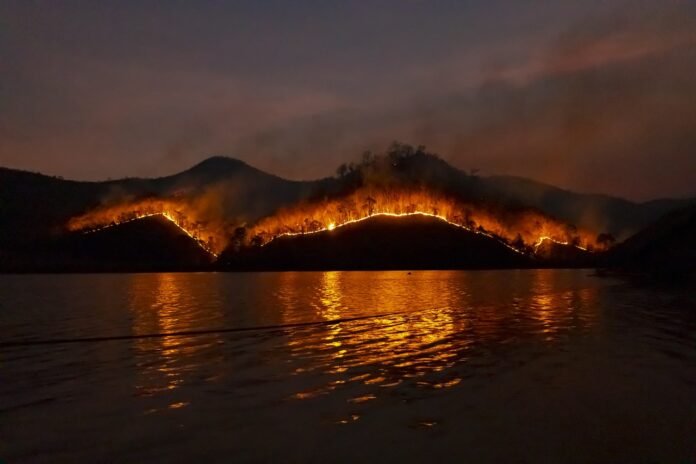Eric Le Quéré’s Vision for a Sustainable Future
Wildfires are no longer seasonal disasters—they have become relentless, year-round threats, intensifying in both scale and frequency. These blazes not only devastate forests, homes, and communities but also send shockwaves through global ecosystems, including the world’s oceans. The intricate connection between land, sea, and climate underscores the urgent need for technological solutions that protect and restore ecosystems on all fronts.
Maritime innovator and investor Eric Le Quéré is at the forefront of this battle, pioneering sustainable ocean technologies that address both marine degradation and the broader climate crisis. His work highlights how the health of our oceans is directly linked to wildfire prevention and climate stability, offering a crucial pathway toward environmental resilience.
How Marine Ecosystem Disruptions Worsen Wildfires
Oceans play a critical role in regulating Earth’s climate, acting as vast carbon sinks that absorb CO₂ from the atmosphere. However, when marine environments are compromised—due to pollution, microplastics, overfishing, and rising temperatures—their ability to store carbon diminishes. This results in increased atmospheric CO₂, exacerbating global warming and setting the stage for drier conditions that fuel catastrophic wildfires.
Beyond carbon storage, the ocean’s health influences weather patterns. Warmer waters intensify hurricanes, shift rainfall distributions, and trigger prolonged droughts—conditions that leave forests parched and highly susceptible to ignition. As wildfires burn, they release vast amounts of carbon back into the atmosphere, accelerating a destructive feedback loopthat weakens marine ecosystems and drives climate extremes.
The Reverse Effect: How Wildfires Harm the Ocean
The impact of wildfires extends beyond land. Smoke and ash from massive fires travel across vast distances, settling into rivers and coastal waters, carrying pollutants, heavy metals, and excess nutrients. This runoff disrupts marine ecosystems, leading to harmful algal blooms, oxygen depletion, and suffocation of aquatic life.
Deforestation from wildfires worsens the situation by eliminating natural buffers against soil erosion. Without trees to stabilize the ground, sediments wash into waterways, burying coral reefs and disrupting marine food chains. This further depletes the ocean’s ability to regulate carbon and climate, compounding the cycle of environmental collapse.
Technology as a Solution: Eric Le Quéré’s Vision for Sustainable Oceans
Understanding the deep connection between marine health, climate stability, and wildfire prevention, Eric Le Quéré has dedicated his career to developing innovative solutions that restore balance to the world’s oceans. His work spans three critical areas:
1. Marine Ecosystem Protection – Boaxt
Le Quéré’s Boaxt technology is a modular floating platform designed for diverse marine applications. These platforms serve as coastal resilience hubs, providing sustainable solutions for marine conservation, coastal protection, and habitat restoration.
2. Sustainable Ocean Resource Management – Netless
Traditional fishing methods contribute to marine destruction through excessive bycatch and plastic pollution. Netless, a groundbreaking dual-purpose fishing and plastic retrieval system, eliminates the need for nets, ensuring sustainable fishing while simultaneously removing plastic waste from the ocean—helping restore vital marine ecosystems.
3. Decarbonization of Maritime Transport – Wingfurl
Recognizing the carbon footprint of the shipping industry, Le Quéré developed Wingfurl, a wind-powered propulsion system that reduces emissions in maritime transport. This innovation provides a cleaner, more sustainable alternativeto conventional fuel-based shipping, aligning the industry with global climate goals.
The Urgency of Action
Wildfires, climate change, and marine degradation are not isolated crises; they are interwoven threads in a global environmental emergency. Without urgent intervention, the collapse of marine ecosystems will weaken carbon sequestration, drive up temperatures, and fuel even more extreme wildfires.
The good news? The solutions already exist. Eric Le Quéré’s pioneering technologies demonstrate that sustainable innovation can reverse environmental decline—but large-scale adoption is necessary. Governments, industries, and private investors must act now to implement and support these technologies on a global scale.
As the climate crisis intensifies, we stand at a crossroads. Do we continue down a path of destruction, or do we embrace bold solutions that restore balance to the planet’s most vital ecosystems? The answer lies in immediate action, collaboration, and a commitment to sustainability. The time to act is now.


